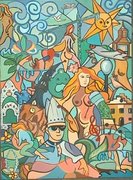Well, i had a chance to listen to the director of Cartas de Alou today- Montxo Arendáriz. His discussion was very pleasant.. the anecdotes that these directors recount are just priceless and invaluable and obviously shed new light on many impressions u would have formed by looking at the film with your own cultural baggage etc. Like there were questions and theories behind whether the initial scene in which Alou´s voice is heard, reading a letter in wolof was supposed to carry subtitles or not and the implications of the director´s intentions.. or whether the fact that there was no real intimacy between the senegalese immigrant Alou and white Carmen, was because these tabou areas are better left untreated, etc.. Well, you would have had to see the film to know where im coming from.. but its really amazing that this film which was made in 1990 when the whole immigration affair in Spain was in its incipient stages... is prophetic in many ways since the entire drama is very much alive and the same more than 15 years later.. i would have asked the director whether there was anything in particular he would have liked to revise or change considering the present polemic and media saturation of the whole affair.. alas, what i did ask was about the whole identity issue vis-a-vis the immigrant taking into consideration Alou´s comments during the film and in the end, trying to return to Spain, adding that he now knows how to treat with the Spaniards..he acknowledged that he wanted to leave it very ambiguous as with the whole identity question. the previous speaker, referring to the film, had noted that Alou se ha españolizado pero el espectador se ha africanizado..
Well, the director emphasised the whole genesis of the film, the racism that pervaded spanish society then although everyone was in denial. the exploitation and subhuman conditions in which many of the immigrants were living etc.. he underlined that in this film, he wanted to give voice to the immigrant, let the immigrant speak and allow the spectator to follow Alou´s journey through his voice and eyes... very nice.. he also noted that he didnt want to indulge neither in "buenismos" or in "criminalizaciones" with respect to the whole immigration debate..in other words, not falling into the trap of maniqueísmos...and the whole problem of having to work with real illegal immigrants, the technical and bureaucatic difficulties etc..
Well, he would have also touched on many issues..like how the majority of the cast could not read spanish which in the end enriched the whole idea of their lines and how this opened up the script to more interpretations from their part after hearing the jist of what the director´s intentions were.. a lot more dialectical and enriching in this sense...and many other anecdotes that allow for multiple interpretations of the film.. he recounted too, for instance, how he was totally blown over when he visited a building designed for about 50 ppl, if i remember right.. but which was rented out to immigrants-in the hundreds- and who converted the building into one of their communities to which they were accostumed- for instance, no doors were closed and a room at the bottom was left for prayers etc.. he added that when he explained this to his friends- who by the way, only lived like 15 km away- they refused to believe him. in fact, he stressed, many ppl assumed that if u entered these places, you would be killed or something because of the image there was of these immigrants- drug addicts, thiefs, violent, indulging only in prostitution etc..
i also asked the director about the scene in the cave- where the immigants lived- and the comments by the moroccan when the senegalese was resistant to stay there because of the subhuman, degrading condition- he told Alou that they were stinking smelly rats etc and therefore that this was where they belonged... when Alou moves to Barcelona, he returns there with Mulai and two Spanish women who look aghast when they see the place... i asked him if he wanted to critically and ironically confront the spaniard with the reality which they denied or avoided... Montxo added that it was actually the initiative of the moroccan who had made this comment and so, it was incoporated into the film...all in all, anécdotas mías based on today´s session which left me feeling both contented and disturbed at the same time... it is in fact a film which continues to shed light, more than 15 years later on the whole topic of African immigration in Spain and the society´s reaction...
Subscribe to:
Post Comments (Atom)

No comments:
Post a Comment